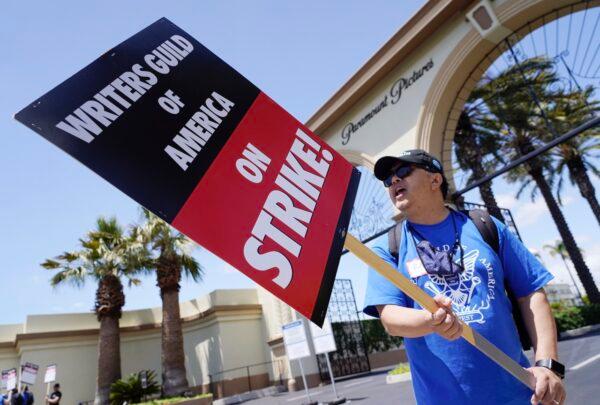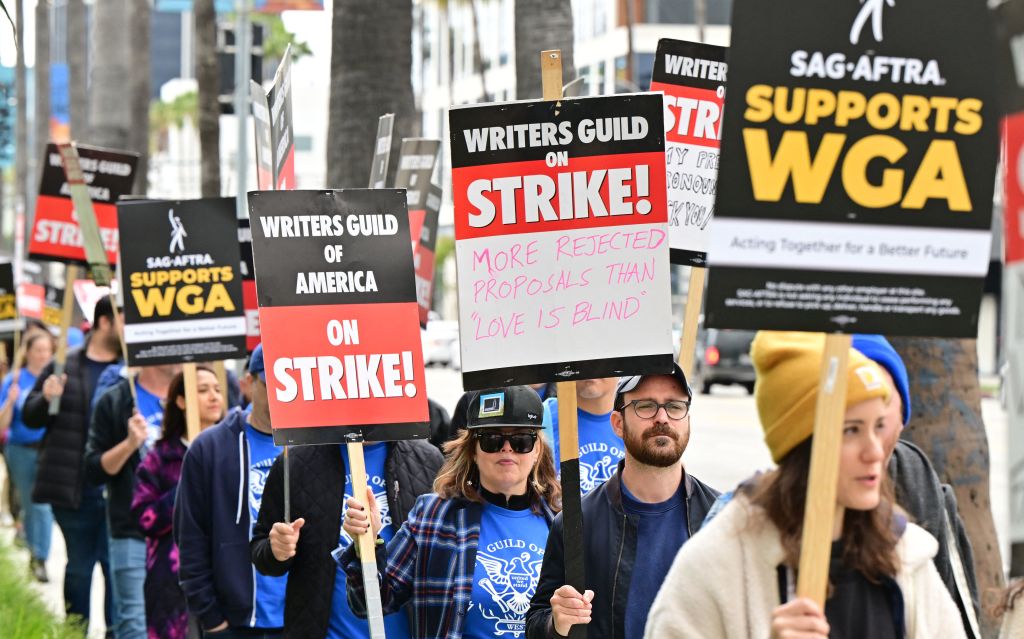LOS ANGELES—A large, multi-union rally in support of striking Writers Guild of America members was held May 26 in downtown Los Angeles as the strike wrapped up its fourth week with no end in sight.
Members of SAG-AFTRA, IATSE, and the Teamsters, along with hotel workers, teachers, SEIU 721, SEIU 1000, and AFSCME joined WGA members in the late afternoon rally at Figueroa and 12th streets near the Convention Center, where the state Democratic Party was holding its annual meeting.
“Solidarity is everything within our unions and among our unions and we have that. We feel that,” WGA President Meredith Stiehm said.
Organizers said the rally-goers represent more than 200,000 workers in Los Angeles whose contracts are set to expire.
SAG-AFTRA is nearing the end of its contract with the Alliance of Motion Picture and Television Producers, which represents the Hollywood studios, and last week its leaders called for a strike authorization vote as labor negotiations approach. The studios are also engaged in contract talks with the Directors Guild of America.
Zero progress has been made in resolving the dispute—with no word of any talks taking place or any on the radar.

A worker wheels equipment past the famous Hollywood sign as preparations continue for the 95th Academy Awards at the Dolby Theatre in Los Angeles, on March 8, 2023. (J. David Ake/AP Photo)
“There is no official rule preventing the studios from making a fair deal with writers while in negotiations with another union,” the WGA wrote on Twitter Thursday. “It’s the studios’ choice to let the strike continue.”
In an email sent to its members on Monday, the WGA acknowledged how difficult it is for writers to be on strike and not get paid.
“I know it’s hard to be out there emotionally and physically,” WGA Negotiating Committee Member Danielle Sanchez-Witzel wrote in the email.
“But we must stay out there in big numbers. Because this is negotiating—being disruptive by picketing and leafletting and demonstrating in public, in combination with withholding of labor, is action. And we are now a significant part of a National and Global Labor Movement.”
The WGA is pushing for improvements on a variety of fronts, notably for higher residual pay for streaming programs that have larger viewership, rather than the existing model that pays a standard rate regardless of a show’s success.
The union is also calling for industry standards on the number of writers assigned to each show, increases in foreign streaming residuals, and regulations preventing the use of artificial intelligence technology to write or rewrite any literary material.

Ray Utarnachitt, a captain in the Writers Guild of America West, pickets with others at an entrance to Paramount Pictures in Los Angeles, on May 2, 2023. (Chris Pizzello/AP Photo)
The AMPTP has pushed back against some of the WGA’s demands, particularly around its calls for mandatory staffing and employment guarantees on programs. It has also pushed back against WGA demands around streaming residuals, saying the guild’s offer would increase rates by 200 percent.
The use of artificial intelligence has emerged as a major topic. The WGA says it wants a ban on the use of AI, and contends the AMPTP has refused to even negotiate the issue. The AMPTP said the issue raises “important creative and legal questions” and requires “a lot more discussion, which we’ve committed to doing.”
The strike has been having an impact on television viewing, with late-night talk shows and “Saturday Night Live” all forced into reruns. The walkout has also prompted numerous television and film productions to shut down as other union members refused to cross the picket lines.
The last WGA strike lasted from November 2007 until February 2008. Industry experts estimated that a 100-day strike cost the local economy between $2 billion and $3 billion.
With both sides still at loggerheads, many observers fear the current walkout could last even longer.
On June 7, the AMPTP is scheduled to begin negotiations with the SAG- AFTRA actors’ union, which has already come out in strong support of the striking writers. The AMPTP began labor talks on May 10 with the Directors Guild of America, which is seeking to address many of the same issues involved in the WGA stalemate. The DGA’s contract with AMPTP expires June 30.













